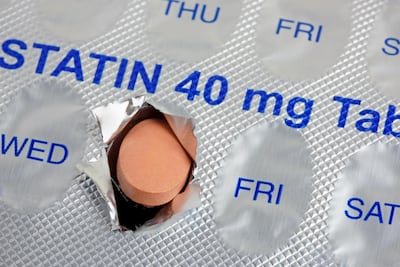Taking drugs called statins to lower levels of “bad” cholesterol in the blood may not save lives, according to new research.
Scientists behind the study have questioned the focus on reducing cholesterol levels in the belief this prevents cardiovascular disease.
Evidence contradicting the prevailing view has, they claim in their paper published this week, “been largely ignored”.
The results are likely to be of particular interest in the UAE, which suffers high rates of cardiovascular disease and where heart attacks among people in early middle age are not unusual.
“In this analysis, over three-quarters of the cholesterol-lowering trials reported no mortality benefit and nearly half reported no cardiovascular benefit at all,” the scientists wrote.
Published this week in BMJ Evidence-Based Medicine, linked to the British Medical Journal, the study was written by researchers in Brazil, France and the United States.
It looked at 35 previous studies analysing the use of statins to cut levels of low-density lipoprotein cholesterol (LDL-C) or bad cholesterol which block blood vessels and causes heart attacks and strokes.
The authors did not find evidence taking statins to lower LDL-C levels cut the risk of death from cardiovascular disease. They said there was no link between the extent to which a person’s LDL-C levels dropped and how much their risk of a heart attack fell.
There is, however, some evidence, they said, that taking statins may lead to unhealthy behaviour that make illness more likely.
Although statin use doubled and cholesterol levels fell in the United States in the early 2000s, the scientists said cardiovascular disease became more common. Similarly, they said increased use of statins in Sweden was not associated with reduced heart attack rates.
High levels of bad cholesterol may be caused by smoking, drinking alcohol, poor diet and lack of exercise, as well as genetic factors.
LDL-C contrasts with high-density lipoprotein cholesterol (HDL-C) or “good” cholesterol, which reduces health risks.
Globally millions of people are prescribed statins, which are typically taken once a day in tablet form, because they cut LDL-C production by the liver.
The researchers acknowledged that because of the role LDL-C is thought to play in causing cardiovascular disease, “it seems logical and intuitive” to target it to reduce a patient’s risk.
But they said decades of randomised controlled trials – where participants are randomly assigned to a test group to try out a treatment – “have failed to show a consistent benefit”.
Indeed, they said that there was more likely to be improvements in a patient’s cardiovascular condition and a reduction in mortality in trials that failed to achieve their targets to reduce LDL-C levels.
According to the World Health Organisation, cardiovascular disease, often linked to fatty deposits building up in blood vessels, is the world’s biggest killer, accounting for 17.9 million deaths a year or 31 per cent of the total. Four out of five of these deaths are due to heart attacks or strokes.
In line with the global situation, in the UAE heart disease is the largest cause of death, accounting for 35 per cent of fatalities in Abu Dhabi emirate in 2015, and 30 per cent in Dubai.
Doctors have previously said problems tend to develop earlier in the UAE, with one cardiologist reporting that the average age for a first heart attack was just 45 – compared to the global average of 65.
Overall, the authors of the new study suggested a change in mindset on issues surrounding statins and LDL-C levels.
“In most fields of science the existence of contradictory evidence usually leads to a paradigm shift or modification of the theory in question, but in this case the contradictory evidence has been largely ignored simply because it doesn’t fit the prevailing paradigm,” they said.
Heart specialists dispute latest findings
Some experts are critical of the new study, with Prof Sir Nilesh Samani, medical director of the British Heart Foundation, saying there was "no question that statins save lives".
"As one of the most widely prescribed drugs in the UK, they have been subject to a huge amount of in-depth scientific research, which time and again, has shown that they're a safe and effective way to prevent heart attacks and strokes," he said.
"Flawed analysis of this vast evidence leads to unnecessary concern and confusion for patients, which can ultimately cost lives."
He said patients prescribed statins "should continue to take them regularly, as prescribed" and that anyone with concerns should raise them with their GP.



